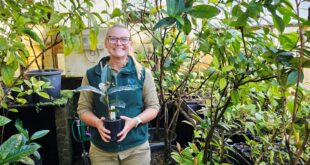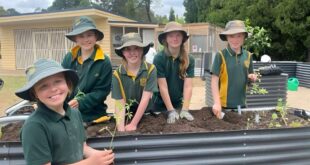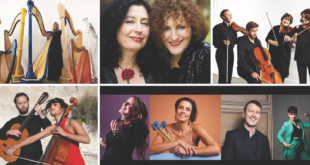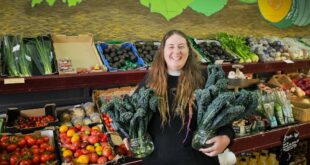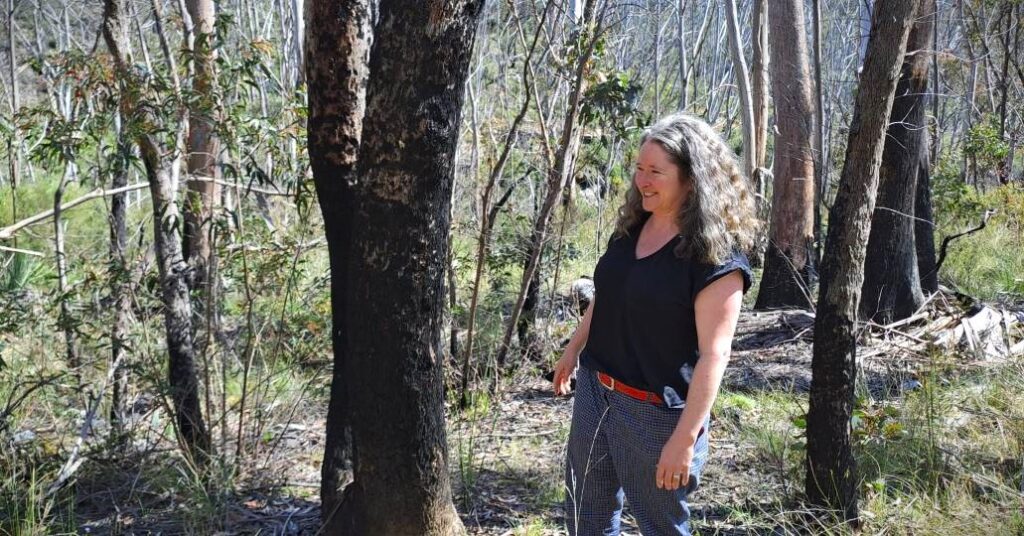
Bianca in the bushland on her Blackheath property.
Blackheathen Bianca Nogrady is an award-winning freelance science journalist, author and broadcaster. She reflects on conversations from this year’s Blue Mountains Writers’ Festival and shares what she and her family are doing towards planetary health.
Story and photos by Hamish Dunlop
Key Points:
- Hope is action
- Talking and connecting with people is critical to managing the effects of climate change.
- Communities are what connect bottom-up and top-down strategies.
Bianca Nogrady is an award-winning freelance science journalist. She lives in Blackheath with her husband and children on a property that borders Pope’s Glen. On top of many articles published around the world, she’s written two books: Climate Change: How We Can Get To Carbon Zero and The End: The Human Experience Of Death. The themes of climate change and death might feel like uncomfortable bedfellows, but together they speak to how we can approach all life, with intelligence, dignity and care.
The kind of hope we need
Earlier this year, Bianca moderated a panel at the Blue Mountains Writers’ Festival. The discussion was titled ‘The kind of hope we need’. One of the themes explored by the panellists was action-as-hope. “The idea is that hope isn’t just passive,” Bianca says. “Hope is given life by humans: that was the real emphasis. Communities and community-level initiatives were also identified as being critical to addressing the effects of climate change. Communities are what connect bottom-up and top-down strategies.”
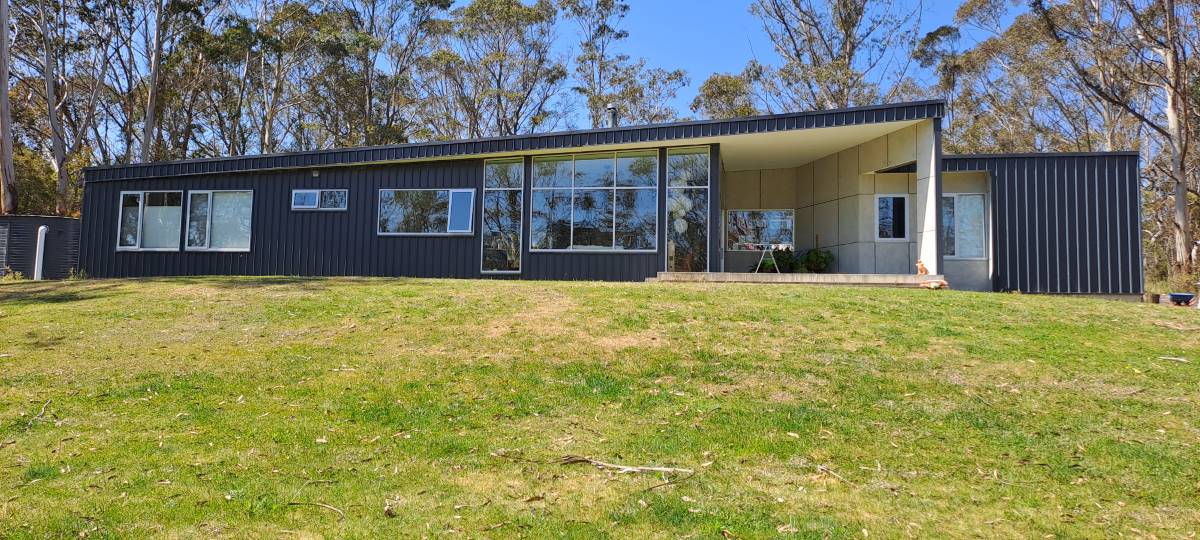
Bianca’s fire-resistant, passive solar home in Blackheath
Bianca’s action-as-hope
Bianca says her family is lucky enough to have the resources to build a fire-resistant house that utilises passive solar – north facing windows – as well as having solar panels on the roof. They don’t have batteries yet, so power-intensive activities such as washing are done during the day when the sun is out.
Bianca has reverse cycle aircon in her office and when the house isn’t warmed enough by the sun, they have a wood burner. The wood burner includes seven tonnes of brick that absorb and radiate heat, making it incredibly efficient.
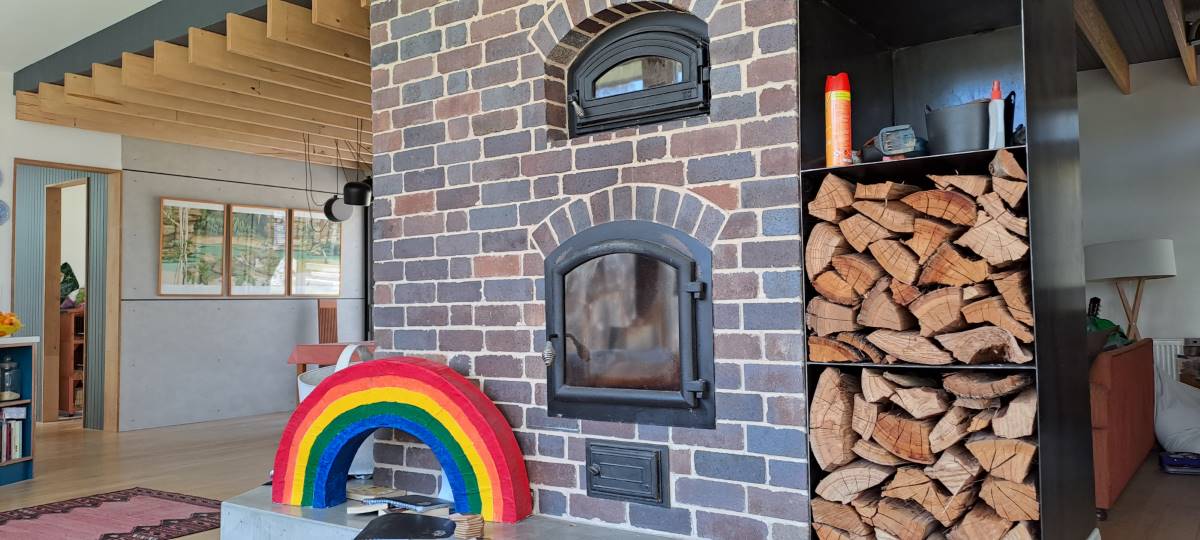
Seven tonnes of brick ensure this wood heater absorbs and radiates heat efficiently
They have a 135,000 litre tank that supplies all the water they need, including drinking water that goes through a double carbon filter. Their electricity supplier provides wholesale rates which means the cost fluctuates throughout the day. Bianca uses this as a way of being conscious about when the best times are to run appliances or to turn things off.
The family also has an Electric Vehicle (EV). Bianca is quick to point out that a couple of years of driving is enough to offset the carbon footprint of an EV. To offset her family’s direct and indirect carbon emissions, she uses Carbon Positive Australia and Climeworks, a company that extracts carbon from the air.
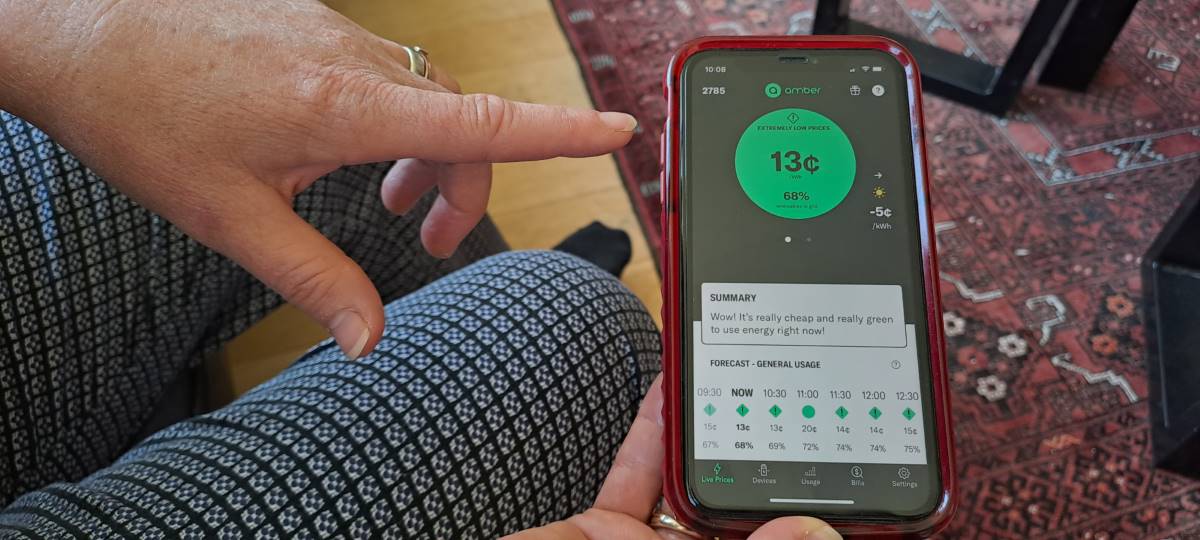
Power-hungry appliances are run during the day when renewables are pumping into the grid and wholesale rates are lowest
They are fortunate to have a property where a grassy asset protection zone could be established that doubles as kangaroo habitat. Bianca believes in decentralised food production, so she grows vegetables and fruit trees and keeps honeybees. “We have to protect the fruit trees from kangaroos,” she says. “It’s a nice problem to have.
“l try to get into the bush and weed too. Soft broom has come up post the 2019 fire, so I’m pulling that out. I also transplant natives: hakeas, banksias and grevilleas. They’re great for the birds and other pollinators. We have a couple of bird baths including a low one for ducklings and a tree nearby provides safe cover. I feel a responsibility to this land and I do as much as I can.”
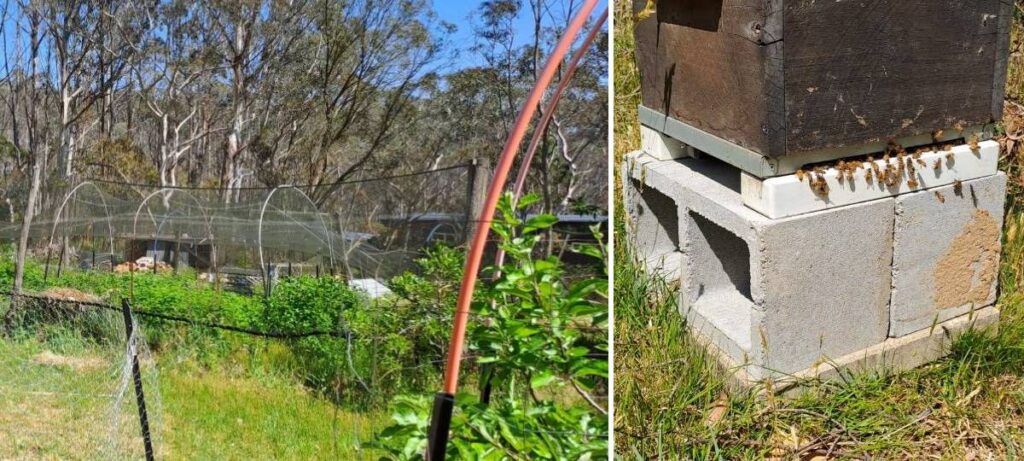
Vegies, fruit trees and honeybees in Bianca’s garden
The responsibility of privilege
Bianca is realistic about who can financially contribute. “People who are renting can’t install solar panels and there is a cost-of-living crisis.” She argues that while governments have a role to play in making climate change adaptation equitable, individuals with resources have a responsibility to contribute for all of us. “The reality is that many of the people at the Writers’ Festival, myself included, are insulated by privilege. In my mind, people that can, should go above and beyond.”
Bianca says this might mean installing rooftop solar, buying an electric car, or installing water tanks. But she also thinks social generosity should be a focus. She gives the example of inviting your elderly neighbours into your solar-powered aircon-equipped home in a heatwave. “Of course, you need to get to know your neighbours to be able to do this,” Bianca says. “This is something we should prioritise in our lives: connecting with people.
“We’re going to be facing the greatest challenge that humanity has ever faced. I really think the only way we’re going to survive is by looking after each other and working together.” – Bianca Nogrady
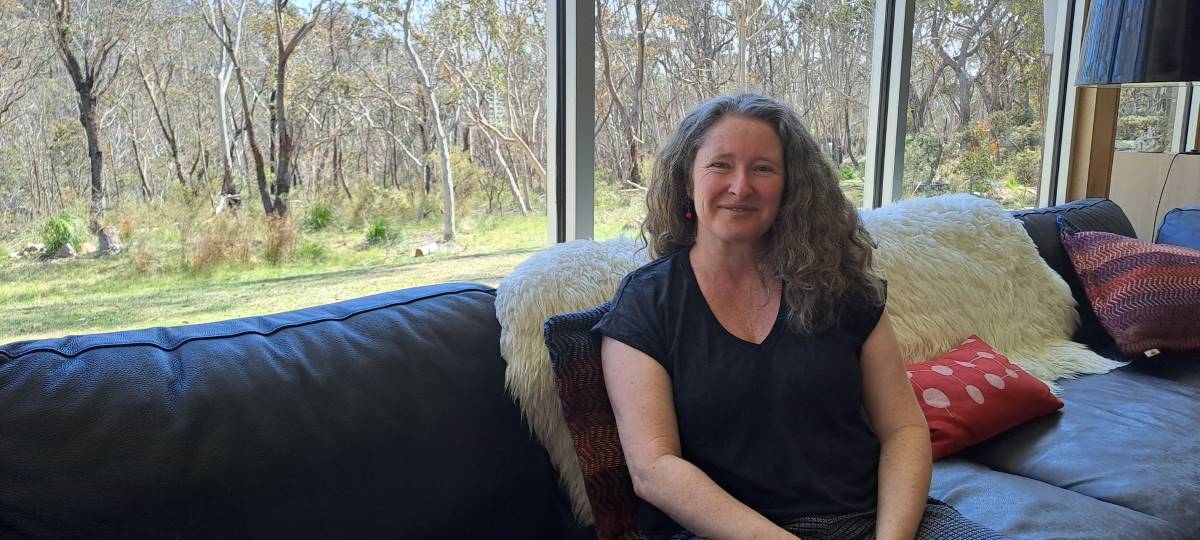
Bianca at home in Blackheath
Adaptation and mitigation
Bianca views adaptation strategies as being as important as mitigation ones. “If we give up on mitigation – getting to carbon neutral – then we’re essentially giving up on future generations. But we need to put equal amounts of energy into adaptation. That could be organic matter-fuelled biogas facilities that generate electricity. It could be community batteries and microgrids. In the age of climate uncertainty, it’s these things, on top of what we do individually, that give us a sense of agency and control.”
She says there’s still a real sense that we are not building to adapt. She was part of another discussion at the Writers’ Festival with biodiversity scientist and land manager Peter Ridgeway. “He talked about the heat islands we’re constructing in urban areas such as Penrith: dark surfaces that soak up heat and radiate it. We’re still trying to put people in places where heat and flood are a significant issue and cramming houses together.”
“We can’t live without plants. Trees and shrubs planted strategically can create microclimates that benefit us and the planet.”
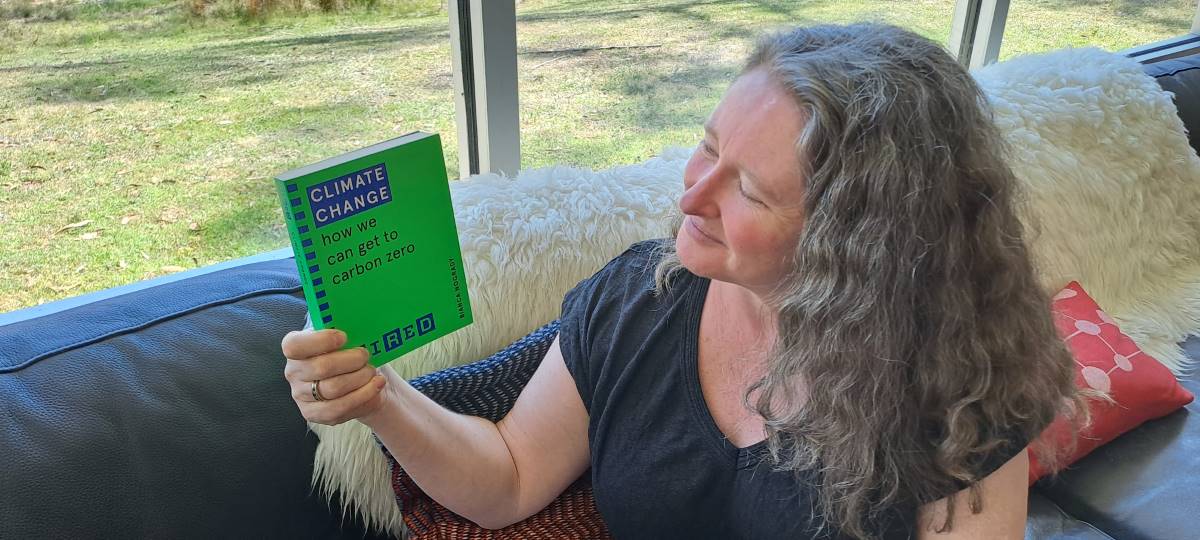
Bianca with her book ‘Climate Change: How We Can Get To Carbon Zero’
Community action
Bianca says that talking with people is an important part of enacting change. “Sharing solutions such as the benefits of water tanks, roof solar and EVs, growing your own food, or having bird baths are places to start. As well as being a writer, I try to engage with people online. One of the points I try to make is that doing things that are good for the planet shouldn’t necessarily be transactional. I think this misses the point that we should act in a way that helps all of us.”
She says councils have a significant role to play and they need to be supported by state and federal governments. “Councils can do a lot of work through their procurement policies and championing projects such as microgrids and community water tanks. Given how the power in Blackheath can be so intermittent, especially during disaster, it would be the perfect place for a microgrid.”
Bianca says in some ways she’s been writing the same stories for 20 years. There is some frustration, but she derives hope from the fact that things are changing at an accelerated rate. “There was a headline the other day about the huge amount of renewable energy in the grid. People are also becoming increasingly aware of the huge challenge we are facing and how they might contribute to a better future.”
As the interview comes to an end, Bianca recalls another question put to the panel at the Writers’ Festival. ‘What do you do when you’re feeling anxious?’ “The answer,” she says, “was take a walk outside. Breath in the scent of eucalyptus oil in the cool air and the fragrance of the earth after rain. Contemplate beauty as it is, here and now. This is about the relationship between our external and internal lives. Being present to beauty, even at it’s most fleeting, holds a flame to hope.”
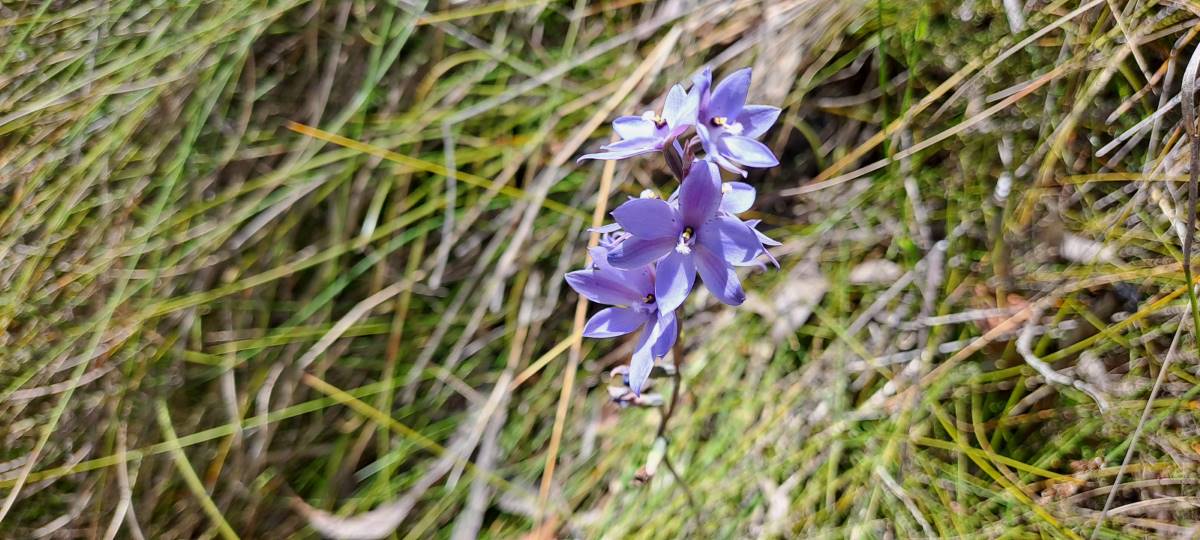
“Being present to beauty, even at its most fleeting, holds a flame to hope.” – Bianca Nogrady
Take Action:
- Do what you can: plant shrubs and trees for pollinators, install solar, be conscious of water use, recycle and reuse, reduce meat consumption.
- Engage with your community and what’s happening at a community level.
- Connect to nature! Being present to the beauty around us is a good antidote to climate anxiety.
Share this article:
This story has been produced as part of a Bioregional Collaboration for Planetary Health and is supported by the Disaster Risk Reduction Fund (DRRF). The DRRF is jointly funded by the Australian and New South Wales governments.
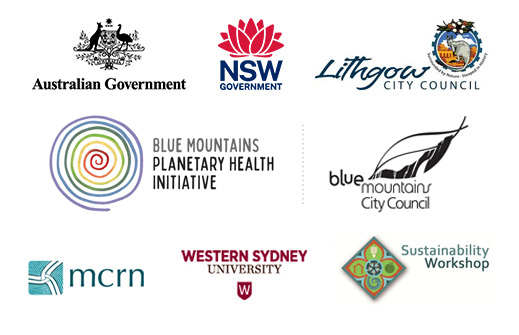
More from around the region
Maligned through the ages for their association with witchcraft, disease, drug use and poisonings, the fungus kingdom is gaining due credit thanks to ecologists, photographers and foragers. Read more in Katoomba Area Local News (link in profile):
https://www.katoombalocalnews.com/fungi-of-the-upper-blue-mountains/
#fungi #fungus #mycelium #fantasticfungi #bluemountains #planetaryhealth #katoomba #foraging #fungiforaging #fungiphotography #ecology
Yesterday we interviewed physicist Emeritus Professor Hans Coster at Middle Earth in Lithgow. He was in charge of the Sydney Chapter of the Club of Rome and we can`t wait to share with you everything we learnt when we visited him in the home he`s built into a hill in Lithgow. Subscribe to our newsletter via any of our news sites to make sure you get this story! Link in profile.
#nickelironbatteries #middleearth #planetaryhealth #hanscoster
Inspiring reading and a video of Harry Laing`s mesmerising performance of `Time of Fire` in the Blue Mountains Planetary Health newsletter (link in profile): https://bit.ly/3UyytbE
Subscribe to receive this fortnightly via any of our news sites:
Katoomba Area Local News: Fungi of the Upper Blue Mountains
Mid Mountains Local News: The Fun Guy: Earth Rising Mushroom Farm in Lawson
Blackheath Area Local News: A Carnival of Camellias: Beauty and Biodiversity at the Blue Mountains Botanic Garden
Springwood Area Local News: Springwood Lot Party: Transforming an Underused Space Into a Vibrant Community Event
Lower Mountains Local News: Women Helping Women to Survive and Thrive
Lithgow Local News: Fabulous Fungi in Lithgow & the Blue Mountains
@botanicsydney @zontaclubbluemountains
#fungi #fantasticfungi #camellias #zonta #camelliasinensis #springwood #harrylaing #timeoffire
With a bit of tweaking we can reduce how much we need to spend on water and energy. Blue Mountains libraries now stock free-to-borrow ‘My Energy and Water Saver’ kits that Blue Mountains residents can use to assess their homes for energy and water efficiency. Belle Butler borrowed one of the kits and discovered some room for improvement in her Lawson home. Read more in Mid Mountains Local News (link in profile) https://www.midmtnslocalnews.com/saving-power-with-take-home-kits/
@bluemountainscitycouncil
#energyefficiency #waterefficiency #savemoney #savetheearth #freeresource #librariesrock #takeaction #planetaryhealth
Blackheath Public School is providing hands-in-the-dirt lessons on how students can make their school more sustainable. From Crunch & Sip to Cluckingham Palace – literally! – organic waste makes the sunflowers shine and worms frolic in the fertile compost. Students will soon be eating spinach and cheese scrolls made by the canteen using garden produce, while parents report their children want to eat more vegetables. Read more in Blackheath Area Local News (link in profile): https://blackheathnews.com/sustainability-at-school/
blackheathpublic_pandc #blackheathpublicschool #blackeath #bluemountains #sustainableschools #schoolgardens #schoolgardensmatter #planetaryhealth
A fun day yesterday for @bluemountainsplanetaryhealth! In the morning we interviewed and filmed the young people in our Upcycling Fashion Skillshare program. They`re helping create the circular economy we need. In the afternoon we ran a workshop on media skills to help another group of young people learn how to create the news we need, and the news they want to see! They learnt how to use green screen and teleprompter technology as well as skills for interviewing and presenting the news. We`re looking forward to sharing the outcomes! Thank you @heli.jones @kalanigacon @kfmmedia #solutionsmedia #thenewsweneed #upcyclingfashion #planetaryhealth #skillshare #katoomba #bluemountains #pluriversity
Such a fabulous day working with a great bunch of young people to learn how news is made, how green screens work and how to create the news we all need to hear. We can`t wait to see the end result!
#solutionsmedia #thefixingnews #thenewsweneedtohear #greenscreens #mediaproduction #planetaryhealth #skillshare
For over 45 years the Springwood Neighbourhood Centre Co-operative has been providing much needed community resources, advice and facilities to the people of the Blue Mountains. Tonje Akerholt and the other staff at the Centre work tirelessly to ensure that the space continues as somewhere everyone can feel welcome and connected, and they offer a fascinating range of volunteer opportunities. Read more in Springwood Area Local News (link in profile):
https://springwoodlocalnews.com/springwood-neighbourhood-centre/
@centre2777 #springwoodneighbourhoodcentre #neighbourhoodcentre #communitycentres #springwood #bluemountains #communitytogether #planetaryhealth
As our ageing infrastructure begins to fail in the face of extreme weather events, the Blue Mountains Planetary Health Initiative is bringing together international experts to ’talk infrastructure` at 10am next Tuesday 23 April.
In 2016 Dr Penny Burns and a group of global asset managers created the Talking Infrastructure Association to focus on improving infrastructure decision making around the world, including developing tools and techniques to ensure that new infrastructure projects will survive the coming changes in technology, demand and climate change - that is, that they will be ‘future friendly’.
Next Tuesday, Ruth Wallsgrove from the UK, a board member of Talking Infrastructure, and a global leading Asset Manager trainer who has trained thousands of people to date on five continents, will join other board members, Dr Penny Burns from South Australia, and Jeff Roorda from Blue Mountains City Council, to look at lessons learned from the last 40 years of asset management that can help us meet the challenges of the next 40 years. Amongst other things, Ruth created the Women in Asset Management North America Network. She will bring to the discussion a long career in asset-intensive industries including water & waste water, rail, power, and cities, in both major government and commercial organisations.
Join us at the Planetary Health Precinct as we discuss the urgent changes needed in our mindsets around assets and the tools we need going forward to protect planetary health and biodiversity, and build climate change resilience.
The event is free but bookings essential (link in profile):https://bit.ly/4aD7bpT
#fitforthefuture #assetmanagement #talkinginfrastructure #planetaryhealth
The Story of Asset Management: Coming up at the Planetary Health Precinct 10am-12noon Tuesday 23 April
As we work at recovering from yet another extreme weather event the question many of us are asking is how do we ensure fit-for-purpose infrastructure in a world that is changing in many ways? This month it is 40 years since Dr Penny Burns developed the engineering-economics hybrid we now know as Asset Management. From 1994 to 2014 her newsletter ‘Strategic Asset Management’ became a beacon in the industry. In 2016 Penny set up Talking Infrastructure with Jeff Roorda, now Director of Infrastructure & Project Delivery Service at @bluemountainscitycouncil to look to the future of Asset Management. Join them for a discussion at the Planetary Health Precinct. They`ll discuss the need for a shift from grey to blue and green assets and address the critical question: we can afford to buy it, but can we afford to keep it?
Join us for this very important discussion. This event is free but bookings essential (link in profile):
https://www.eventbrite.com.au/e/talking-infrastructure-40th-anniversary-tour-of-australia-and-new-zealand-tickets-875789759747
#infrastructure #greeninfrastructure #assetmanagement #pennyburns #disasterriskreduction #disasterrecovery #fitforthefutureinfrastructure #newparadigms #planetaryhealth #symbiocene
The Rural Clinical School of the The University of Notre Dame in Lithgow, together with the Blue Mountains Planetary Health Initiative, have been introducing first year medical students to rural medicine, Aboriginal Health and Planetary Health. When given hands-on experience in using a thermal imaging camera they were very surprised to see the difference between the temperature of the deep shade under a tree and the temperature of pavers in full sun was 30C!
Read more in Lithgow Area Local News (link in profile):
https://lithgowlocalnews.com/introducing-medical-students-to-planetary-health/
#firstyearmedical #futuredoctors #ruralhealth #aboriginalhealth #planetaryhealth #heatwaves
#heatislandeffect #thermalimaging
For an entire year over COVID lockdowns, Merryl Watkins posted a new bird photo on social media every day. The Blaxland resident wanted to remind people there was still beauty in the world and joy to be found if you stop, look and listen. Her photography obsession captured imaginations both in the Blue Mountains and overseas, raising awareness of endangered wildlife and treating audiences to the fun antics of our feathered friends. Read more in Lower Mountains Local News (link in profile): https://lowermtnslocalnews.com/merryl-watkins/ @merrylwatkinsphotography #birdsofthebluemountains #birdsofaustralia #birdphotographyaustralia #biodiversity #planetaryhealth #blaxland #bluemountains #beauty #resilience #hope


